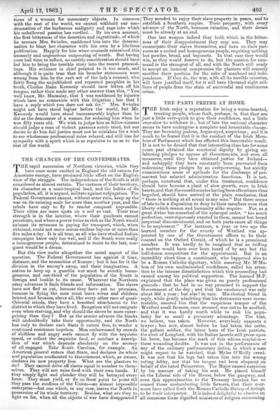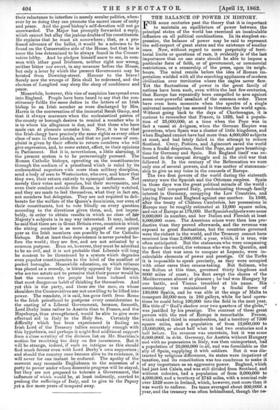THE PARTI PRETRE AT HOME.
THE Irish enjoy a reputation for being a warm-hearted, trusting people, whose fault, perhaps, is, that they are just a little over-quick to give their confidence, and a little over-slow to withdraw it ; but of late the national character seems to have undergone a complete and lamentable change. They are becoming jealous, Argus-eyed, suspicious ; and it is much to be feared that it is the conduct of the Irish Mem- bers of Parliament which has effected this lamentable result. It is not to be denied that that interesting class has for some years past obtained the senatorial dignity by giving un- faltering pledges to oppose all Governments, and even all measures, until they have obtained justice for Ireland— and unhappily they have constantly been prevented from redeeming those pledges by an overpowering, but strictly conscientious sense of aptitude for the discharge of per- matrent but salaried administrative functions. It is not, perhaps, unnatural that, under this treatment, confidence should have become a plant of slow growth, even in Irish hearts, and that the constituencies havingbeen oftentimes thus beguiled, should have arrived at the plain conclusion, that " there is nothing at all sound in any man." But there seems of late to be a disposition to deny to their members even that liberty which reason and humanity alike require. For, as a great divine has remarked of the episcopal order, " too much perfection, over-rigorously exacted in them, cannot but breed perpetual discontentment, and on both parts cause all things to be unpleasant." For instance, a year or two ago the learned member for the county of Wexford was ap- pointed by one of the Government offices to be their counsel on the Oxford Circuit, of which he is a prominent member. It was hardly to be imagined that so trifling a matter would have ever been heard of by any but the half-dozen competitors for the appointment. But in an incredibly short time a constituent, who happened also to be a Roman Catholic dignitary, while assuring Mr. McMa- hon of his own undiminished confidence, called his atten- tion to the intense dissatisfaction which this proceeding bad caused among his political supporters. The learned M.P. explained that the place was given on purely professional grounds : that he had in no way promised to support the Government of the day ; and that the emolument was only about 301. a year ; but alas ! in vain. His clerical friend in reply, while gently admitting that his statements were incon- testable, assured him that the suspicious temper of the Wexford small farmers, once aroused, was not to be soothed, and that it was hardly worth while to risk his popu- larity for so small a pecuniary advantage. The hint, we believe, was taken. However, everybody suspects a lawyer ; but now, almost before he had taken the oaths, the gallant soldier, the latest born of the Irish patriots, the elect of Longford, with his Italian laurels still green upon his brow, has become the mark of this odious suspicion— these wounding doubts. It was not in the performance of any of the ordinary parliamentary duties, in which a man might expect to be watched, that Myles O'Reilly erred. It was not that his legs had taken him into the wrong voting lobby, nor that his tongue bad been eloquent on behalf of the bated Palmerston. The Major caused suspicion by his manner of taking his seat. He placed himself on the Liberal side of the House, below the gangway, and even this approximation to the Treasury benches has so roused those unslumbering little farmers, that their mur- murs have called forth the Roman Catholic Bishop of Ardagh to be their interpreter. It is indeed delightful to observe on all occasions these dignified ministers of religion overcoming their reluctance to interfere in merely secular politics, when- ever by so doing they can promote the sacred cause of unity and peace. And the good bishop's self-devotion will not go unrewarded. The Major has promptly forwarded a reply, which cannot but allay the jealous doubts of his constituents. He explains that he must sit somewhere ; that, as a pro- fessed advocate of the ballot, it would be a solecism to be found on the Conservative side of the House, but that he is none the less determined to be always found in the Conser- vative lobby. And he pledges himself anew to see, in com- mon with other good Irishmen, neither right nor wrong, neither bitter nor sweet, in any measure before the House, but only a lever by which the present Government may be hoisted from Downing-street. Honour to the brave ! Surely now the wrongs of Erin shall be redressed, and the electors of Longford may sleep the sleep of confidence and peace. Meanwhile, however, this vice of suspicion has spread even into England. People have been heard to say that the con- stituency fulfils the same duties in the letters of an Irish bishop to an Irish member as were discharged by Mrs. Harris in the conversation of the immortal Sarah Gamp, and that it always murmurs when the ecclesiastical patron of the county or borough desires to remind a member who it is to whom his allegiance is due, and that those who have made can at pleasure unmake him. Now, it is true that the Irish clergy have precisely the same rights as every other class of men in these islands, and that no just cause of com- plaint is given by their efforts to return members who will give expression, and, to some extent, effect, to their opinions in Parliament. But it is, nevertheless, a little alarming, if the present system is to be perseveringly pursued. The Roman. Catholic bishops, operating on the constituencies through the medium of a priesthood which is ruled by its ecclesiastical superiors with more than military discipline, send a body of men to Westminster, who owe, and know that they owe, their return entirely to episcopal influence. Not merely their votes and speeches, but their movements, and even their conduct outside the House, is carefully watched, and they are made to feel themselves, what they in fact are, not members but delegates. They are not required to deli- berate for the welfare of the Queen's dominions, nor even of their constituents, but to vote blindly on every question according to the directions given them, and, not impro- bably, in order to obtain results in which no class of. her Majesty's subjects is in any way interested. It may, indeed, be said that there are in Great Britain even, counties in which the sitting member is as mere a puppet of some great peer as the Irish members can possibly be of the Catholic bishops. But at least their dependence is never paraded be- fore the world ; they are few, and are not actuated by a common purpose. Even so, however, they must be admitted to be an evil, and it is not probable that Liberals will long be content to be threatened by a system which degrades even popular constituencies to the level of the smallest of pocket boroughs. Meanwhile education, on which reliance was placed as a remedy, is bitterly opposed by the bishops, who are too astute not to perceive that their power would be lost the moment the people had been imbued with that most dangerous habit of thinking for themselves. And yet this is the party, and these are the men, on whose shoulders the Conservatives are not unwilling to be lifted into power. The mandate, it is said, has gone forth from Rome to the Irish priesthood to postpone every consideration to the ousting of a Liberal Government, because, forsooth, Lord Derby leans rather to Austria than to France, and the Hapsburgs, thus strengthened, would be able to give more effectual aid in Italy to the Holy See. Certainly the difficulty which has been experienced in finding an Irish Lord of the Treasury tallies accurately enough with this hypothesis, and perhaps it might find additional support from a close scrutiny of the division list on Mr. Sheridan's motion for remitting the duty on fire insurances. But it will be strange, indeed, if such an intrigue as this should find much favour even with Lord Derby's own supporters ; and should the country once become alive to its existence, it will never for one instant be endured. The apathy of the moment may reconcile Englishmen to the accession of a party to power under whom domestic progress will be stayed, but they are not prepared to tolerate a Government, the influence of which would be, at least indirectly, exerted to prolong the sufferings of Italy, and to give to the Papacy yet a few more years of temporal sway.































 Previous page
Previous page